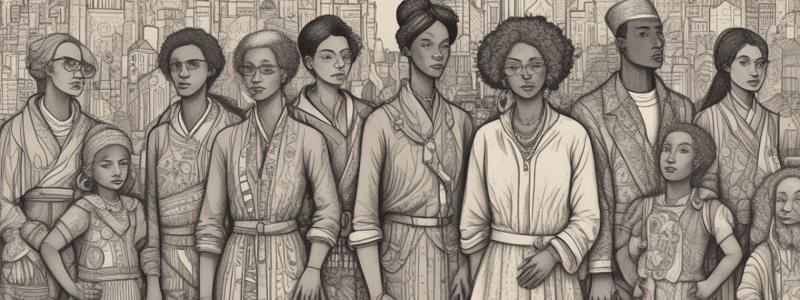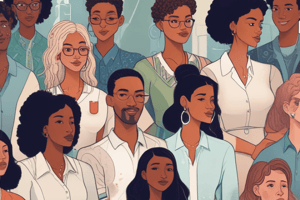Podcast
Questions and Answers
Match the following terms with their definitions:
Match the following terms with their definitions:
Racial Equity Initiatives = Deliberate efforts to address and eliminate racial disparities in all aspects of an organization Racial Equity Lenses = Tools to comprehend and address the roots of inequality Systemic Racism = Unconscious bias in an organization Social Justice = Creating a more equitable world
Match the following concepts with their purpose:
Match the following concepts with their purpose:
Racial Equity Initiative = To eradicate racial disparities Racial Equity Lens = To understand the root causes of inequality Inclusion = To promote cultural diversity Cultural Diversity = To recognize the existence of racial disparities
Match the following outcomes with their corresponding initiatives:
Match the following outcomes with their corresponding initiatives:
Reducing the impact of organizational hierarchies = Racial Equity Initiatives Eliminating racial disparities = Racial Equity Initiatives Creating a more just and fair society = Racial Equity Initiatives Recognizing racial disparities = Racial Equity Lenses
Match the following terms with their characteristics:
Match the following terms with their characteristics:
Match the following concepts with their goals:
Match the following concepts with their goals:
Match the following terms with their descriptions:
Match the following terms with their descriptions:
Match the following practices with their descriptions:
Match the following practices with their descriptions:
Match the following steps with their purposes in the organizational change framework:
Match the following steps with their purposes in the organizational change framework:
Match the following practices with the tools they provide to employees:
Match the following practices with the tools they provide to employees:
Match the following outcomes with the corresponding practices:
Match the following outcomes with the corresponding practices:
Match the following practices with the levels of the organization they engage:
Match the following practices with the levels of the organization they engage:
Match the following practices with their focus:
Match the following practices with their focus:
Match the following with the benefits of promoting racial equity:
Match the following with the benefits of promoting racial equity:
Match the following steps with leading a racial equity initiative:
Match the following steps with leading a racial equity initiative:
Match the following racial equity initiatives with their main goals:
Match the following racial equity initiatives with their main goals:
Match the following with the importance of understanding racial equity politics:
Match the following with the importance of understanding racial equity politics:
Match the following with the benefits of educating yourself on racial equity:
Match the following with the benefits of educating yourself on racial equity:
Match the following with the role of marginalized communities in racial equity initiatives:
Match the following with the role of marginalized communities in racial equity initiatives:
Match the following with the importance of using data and research in racial equity initiatives:
Match the following with the importance of using data and research in racial equity initiatives:
Match the following with the benefits of taking action in racial equity initiatives:
Match the following with the benefits of taking action in racial equity initiatives:
Match the following with the importance of engaging in dialogue in racial equity initiatives:
Match the following with the importance of engaging in dialogue in racial equity initiatives:
Match the following with the role of cultural diversity best practices in racial equity initiatives:
Match the following with the role of cultural diversity best practices in racial equity initiatives:
Flashcards are hidden until you start studying




